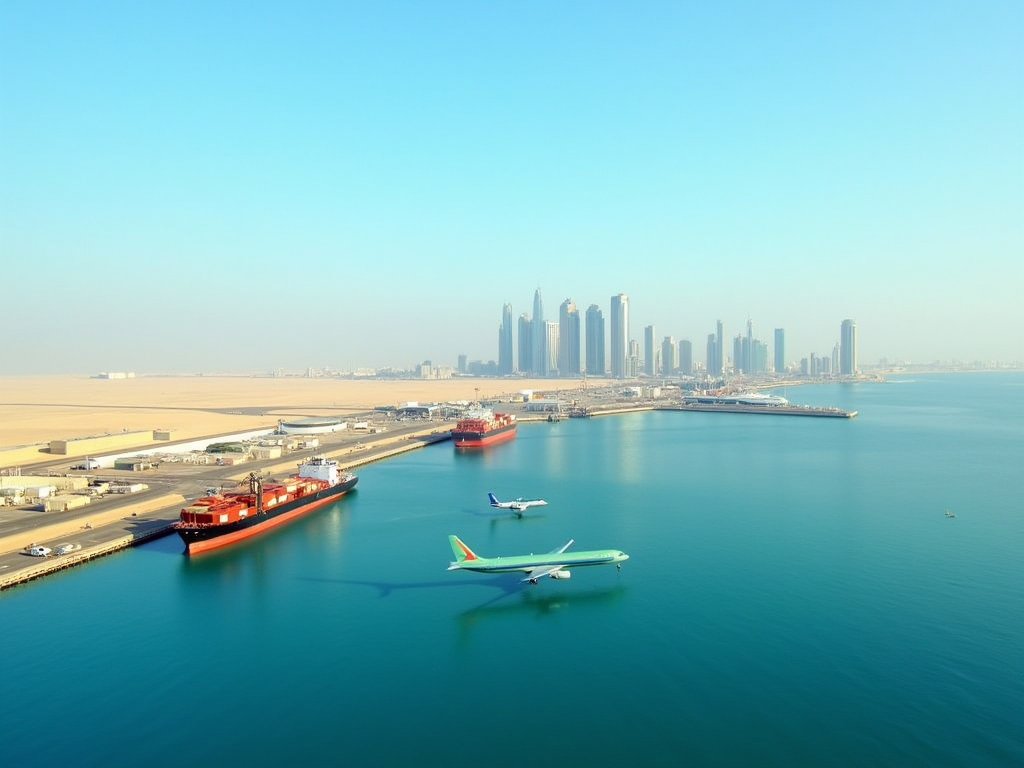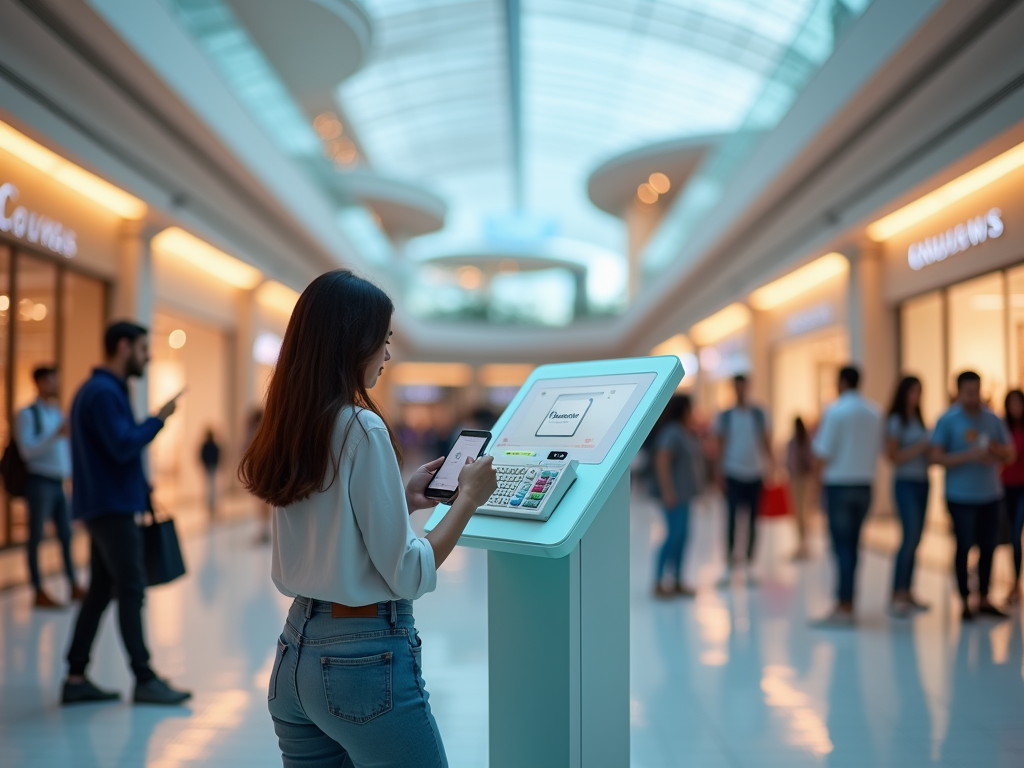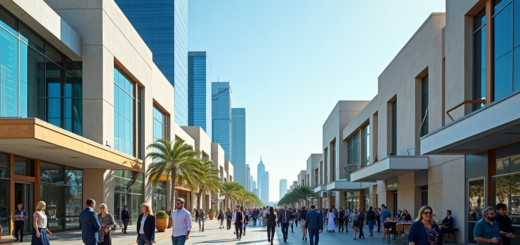How Dubai Became a Key Player in the Global E-Commerce Supply Chain
Dubai has emerged as a pivotal hub in the global e-commerce supply chain, thanks to its strategic geographical location, advanced logistics infrastructure, and favorable business environment. The city’s initiatives aimed at digital transformation, coupled with government support for trade and innovation, have significantly enhanced its appeal as a center for e-commerce activities. This article will explore the factors contributing to Dubai’s ascent in the e-commerce landscape, highlighting its role and the future potential it holds in global trade.
The Strategic Location of Dubai

One of the most compelling reasons Dubai has cemented its status in the global e-commerce supply chain is its strategic geographical location. Situated at the crossroads of Europe, Asia, and Africa, Dubai serves as a gateway for businesses to access diverse markets quickly and efficiently. The city’s proximity to major shipping routes and its well-established air and sea ports facilitate seamless logistics operations. Below are key aspects of Dubai’s location advantages:
- Access to Emerging Markets: Dubai connects businesses with rapidly growing regions such as the Middle East, North Africa, and South Asia.
- Efficient Transportation Networks: With the Dubai International Airport and Jebel Ali Port, the city boasts one of the world’s busiest cargo hubs.
- Time Zone Benefits: Operating in a time zone that overlaps with both Asian and European markets allows for quick turnaround times.
Advanced Logistics Infrastructure

Dubai’s logistics infrastructure is exemplary and plays a critical role in its e-commerce success story. The emirate has heavily invested in state-of-the-art facilities such as warehousing, distribution centers, and transportation networks that enhance overall operational efficiency. Having sophisticated systems in place allows e-commerce businesses to ensure fast delivery and inventory management. Notable features of Dubai’s logistics infrastructure include:
- High-tech warehouses equipped with automation technologies for improved accuracy.
- Extensive road, air, and sea freight options that cater to diverse delivery needs.
- Customs and regulatory frameworks streamlined for swift clearance of goods.
The UAE government has actively promoted policies that foster a conducive environment for e-commerce growth in Dubai. Initiatives such as “Dubai Internet City” and “Dubai Logistics City” provide the necessary ecosystem for technology and logistics companies. These zones offer tax incentives, reduced regulatory hurdles, and infrastructure support, driving more businesses to set up operations in the city. Furthermore, the government has also launched programs to develop digital payment solutions and bolster cybersecurity, thereby boosting consumer confidence in online shopping.
Shift in Consumer Behavior
The rise in internet penetration and smartphone usage has significantly transformed consumer behavior, with more people embracing online shopping in Dubai. The COVID-19 pandemic served as a catalyst for this shift, further accelerating the uptake of e-commerce. Consequently, businesses have had to adapt their strategies to cater to this changing landscape effectively. Key aspects of this behavioral shift include:
- Increased Demand for Online Shopping: Consumers now prefer the convenience of shopping from home.
- Preference for Local Delivery: Consumers favor businesses that offer fast and reliable delivery options.
- Rise in Cross-Border Shopping: Shoppers are increasingly inclined to explore global brands beyond their local market.
Future Opportunities and Challenges
As Dubai continues to position itself as a key player in the e-commerce supply chain, it also faces several challenges that need to be addressed. Rising competition from other global players and changing regulatory landscapes demand that Dubai continuously innovates and improves its offerings. Opportunities also lie in harnessing technological advancements, such as artificial intelligence and blockchain, to streamline logistics and enhance customer experiences. Therefore, the following strategies can be employed to ensure continued growth:
- Investing in cutting-edge technologies to optimize supply chain efficiency.
- Expanding partnerships with global e-commerce platforms to increase market reach.
- Enhancing customer support and engagement to strengthen brand loyalty.
Conclusion
In summary, Dubai’s emergence as a key player in the global e-commerce supply chain can be attributed to its strategic location, advanced infrastructure, government support, evolving consumer behaviors, and a proactive approach towards innovation. As the global landscape continues to evolve, Dubai’s potential as an e-commerce hub remains promising. To maintain its competitive edge, ongoing investments in technology, logistics, and customer engagement will be essential.
Frequently Asked Questions
1. Why is Dubai considered a logistics hub for e-commerce?
Dubai’s strategic geographical location, advanced infrastructure, and optimal shipping routes make it an accessible and efficient logistics hub for e-commerce businesses aiming to operate globally.
2. What government initiatives support e-commerce in Dubai?
The UAE government has established several free zones, such as Dubai Internet City and Dubai Logistics City, providing tax incentives and reduced regulations to encourage e-commerce growth.
3. How has consumer behavior changed in Dubai regarding e-commerce?
Increasing internet usage and the COVID-19 pandemic have led to a significant rise in online shopping, with consumers favoring convenience, local delivery options, and a broader selection of brands.
4. What challenges does Dubai face in the e-commerce sector?
Dubai faces challenges such as increased competition from other markets, evolving regulations, and the need for continuous technological advancements to remain competitive.
5. What future opportunities exist for e-commerce in Dubai?
Dubai can leverage advancements in technology, expand partnerships with global e-commerce platforms, and enhance customer experience to seize future opportunities in the e-commerce sector.







